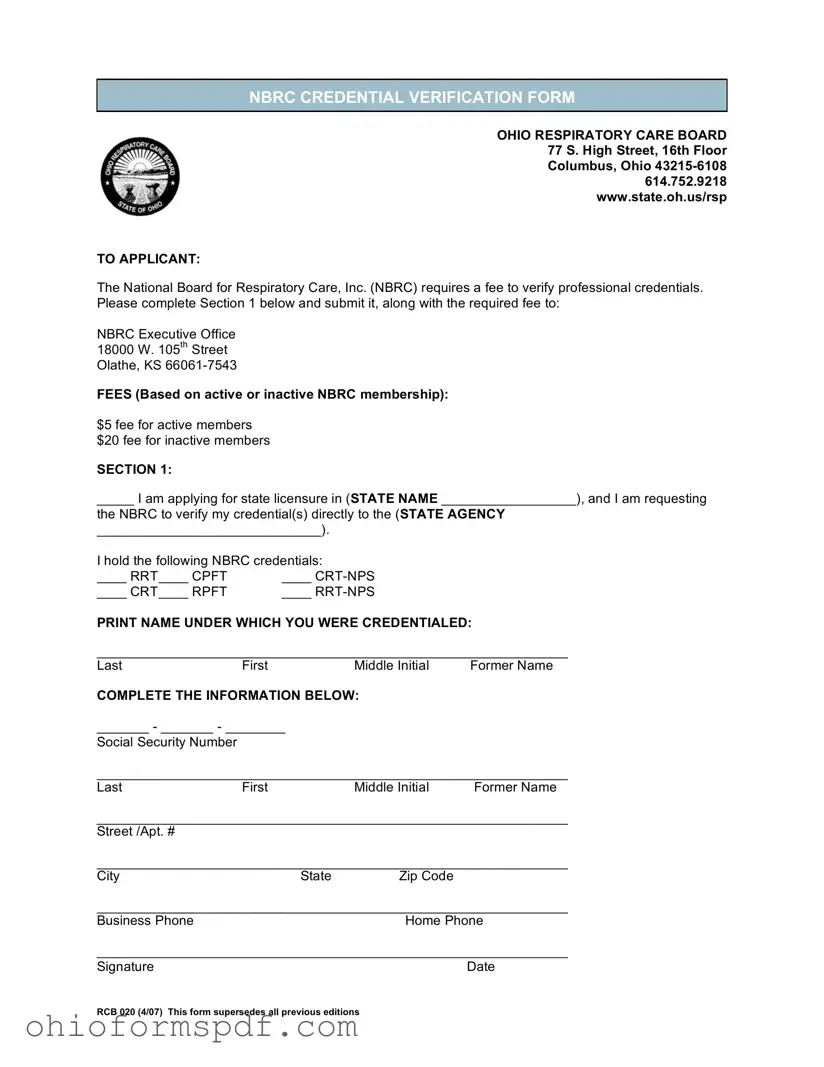What is the Ohio RCb 020 form used for?
The Ohio RCB 020 form is a crucial document for healthcare professionals seeking to have their respiratory care credentials verified by the National Board for Respiratory Care, Inc. (NBRC) for state licensure purposes. This verification is a necessary step for those applying for licensure in the state of Ohio, ensuring the Ohio Respiratory Care Board recognizes their professional qualifications.
Who needs to submit an Ohio RCb 020 form?
Any respiratory care professional applying for state licensure in Ohio and needing to verify their credentials through the NBRC should submit the Ohio RCB 020 form. This includes individuals holding NBRC credentials such as Registered Respiratory Therapist (RRT), Certified Pulmonary Function Technologist (CPFT), Certified Respiratory Therapist–Neonatal/Pediatric Specialist (CRT-NPS), Registered Pulmonary Function Technologist (RPFT), and Registered Respiratory Therapist–Neonatal/Pediatric Specialist (RRT-NPS), among others.
What are the fees associated with the form?
The fee for verifying professional credentials through the NBRC varies depending on the applicant's membership status with the NBRC. Active members are required to pay a $5 fee, while inactive members must pay $20.
Where should the completed form be sent?
After completing Section 1 of the form, applicants must mail it along with the required fee to the NBRC Executive Office, located at 18000 W. 105th Street, Olathe, KS 66061-7543. This ensures that the NBRC can process the verification request.
What information is required on the Ohio RCB 020 form?
To complete the Ohio RCB 020 form, applicants need to provide their personal information, including their name (as credentialed), Social Security Number, address, and phone numbers. Additionally, they must indicate the state in which they are seeking licensure and specify which NBRC credentials they are requesting to be verified.
How do I know if I'm an active or inactive member of the NBRC?
Membership status with the NBRC is determined by your current engagement and compliance with their requirements. Active members are those who have kept up with all necessary renewals and continued education, whereas inactive members may have lapsed in meeting these requirements. To confirm your status, contact the NBRC directly.
Can I submit the Ohio RCB 020 form for licensure in a state other than Ohio?
The Ohio RCB 020 form is specifically designed for individuals applying for respiratory care licensure in the state of Ohio. If you're seeking licensure in another state, you should check with the respective state's respiratory care board or the NBRC for the appropriate form or procedure.
What should I do if I've held credentials under a different name?
If your NBRC credentials were obtained under a different name (e.g., maiden name), it's essential to indicate this on the Ohio RCB 020 form by including your former name in the provided space. This ensures that the NBRC can accurately verify your credentials without delay or confusion.


